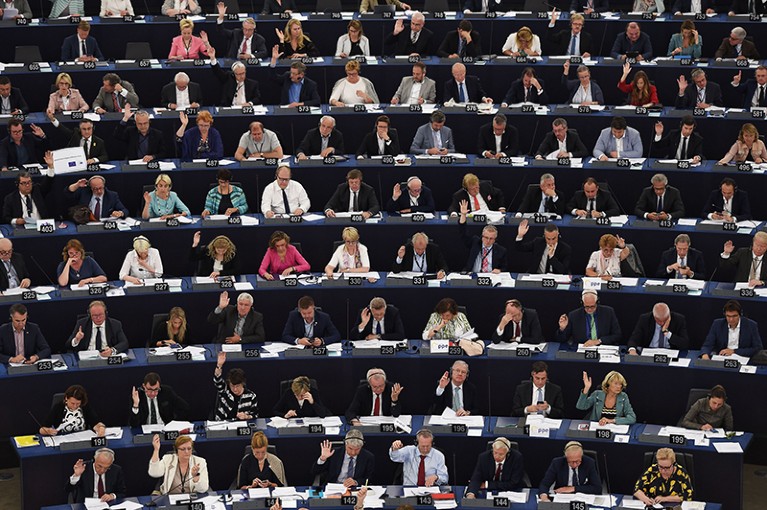
Elections for the European parliament will take place in May. Credit: Frederick Florin/AFP/Getty
This week, the European Union is holding parliamentary elections — as it does every five years — and researchers are paying close attention. With the United Kingdom still scheduled to leave the bloc, and with populist and nationalist sentiment growing in many nations, there’s a sense that the integration on which the EU has thrived for decades might be on the wane. Last month, the European Geosciences Union held a special session at its general assembly in Vienna to air concerns on the topic, and issued a declaration that “threats to a united Europe are threats to scientific research”.
It’s right. The value of an integrated EU for science hasn’t been lauded enough. The unique economic and political union built from the rubble of Europe after the Second World War has created an increasingly peaceful and prosperous continent, and has spun a precious web of research collaborations among its member states and beyond. No other group of countries collaborates at such a scale. That’s why, in a special issue this week, Nature is looking beyond Brexit to the future of research in Europe.
Convinced that research is the bedrock of economic and social progress, EU member states have committed an increasingly larger share of their central budget to it. The EU’s framework programme for research and innovation has grown from 4% of its annual budget a decade ago to 8% now, and totals €74.8 billion (US$83.5 billion) for 2014–20 alone. Although this represents only around one-tenth of individual EU member states’ public research and development spending, the framework programme has set up the highly competitive European Research Council (ERC) and has incorporated a widely admired system of cross-border research projects and training fellowships, enabled by the close harmony of the EU’s single market. The research programmes have been powerful forces for European integration: it’s now taken for granted that scientists should be able to live and work anywhere they want in the bloc.
The EU earmarks extra funds — €44 billion — to help poorer nations to build up their research infrastructure; these funds have been particularly valuable to the formerly communist Eastern European nations that have joined the bloc since 2004. This geographic diversity breeds stronger research. And EU member states, recognizing that they are more powerful together than apart, have crafted world-leading policies on environmental standards — including climate change, chemical regulation and plastics pollution. They are also setting new, exemplary standards for data protection (in the form of general data-protection regulation) and open science that will influence much of the rest of the world.
So what does the future hold? Although Europe’s relative share of global science and research spending is shrinking (as China’s expands), its research remains highly cited and influential. One possible cloud is growing inequality in European science: since the global financial crisis of 2008, countries such as Spain haven’t recovered their former levels of research spending and number of scientists. Some of the newer EU member states seem unwilling to make large domestic investments in research, which could put them at risk of falling further behind.
The EU is now planning its next budget and big framework programme, called Horizon Europe, set to run from 2021 to 2027 — which a new parliament and commission will continue hammering out later this year. Concerns that this parliament might be less research friendly should be tempered: some parliamentarians have been much more committed than national science ministers in EU member states to the task of supporting European science. And although the increased desire for innovation and translation in Horizon Europe is laudable, it must remain grounded. There is no innovation without fundamental research, and so the parties involved in budget negotiation should give a more generous increase to the ERC, which has to reject too many good projects because of limited funds.
It is clear which lessons the new parliament — and others interested in furthering global research — should take from EU history. Rigorous research is essential for addressing societal and environmental challenges. Producing it requires collaboration, long-term planning and stability, and holding fast to those strengths against populism, nationalism or any other forces that threaten to drive countries apart. The future parliament should champion this — and individual researchers can, too. They should simply tell others how the EU is fundamental to their work.

 Boon or burden: what has the EU ever done for science?
Boon or burden: what has the EU ever done for science?
 Views from a continent in flux
Views from a continent in flux
 The future of science in Europe
The future of science in Europe
 How European scientists will spend €100 billion
How European scientists will spend €100 billion
 Europe’s controversial plans to expand defence research
Europe’s controversial plans to expand defence research
 Europe the rule-maker
Europe the rule-maker
 Europe is a top destination for many researchers
Europe is a top destination for many researchers



